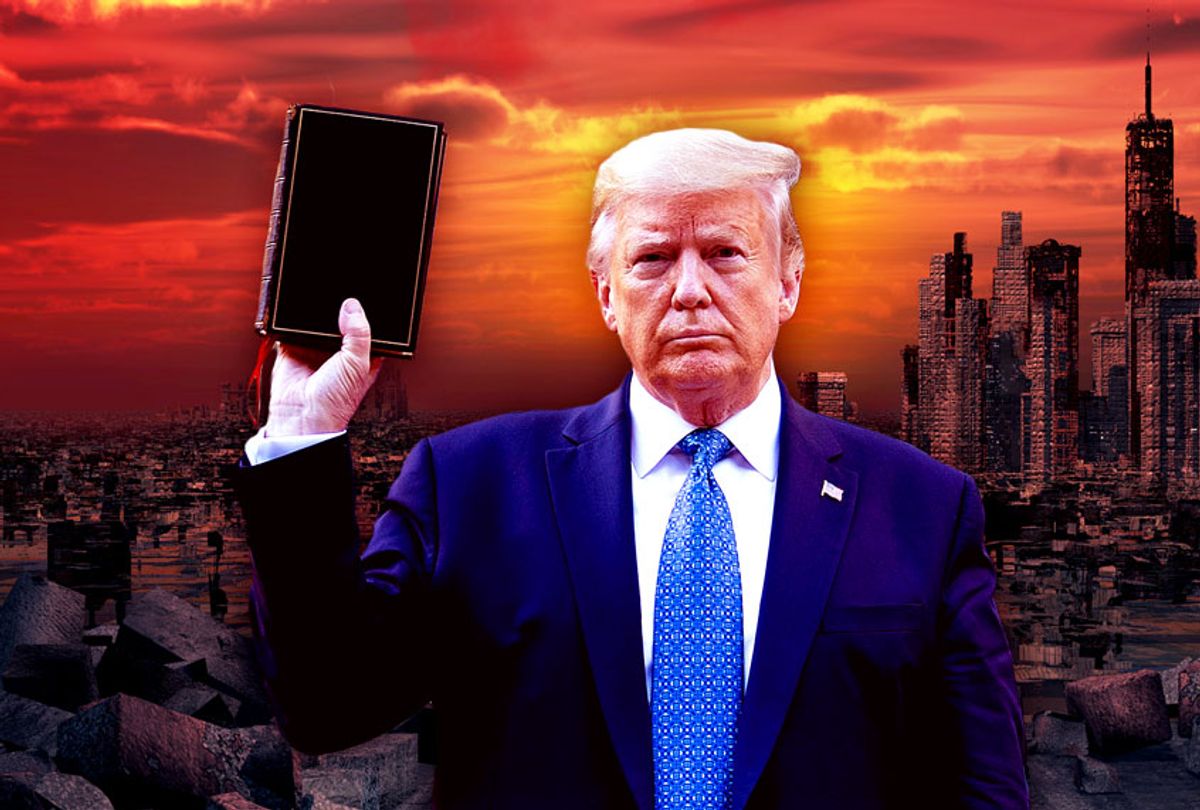Yea, verily. The prophecy seemeth nigh unto fulfillment. The one about Donald Trump appointing three Supreme Court justices. No, it's not in the Bible, but it's part of a body of predictions about Trump that have been delivered since 2011 by a collection of charismatic and Pentecostal Christian prophets. With the hearings for Amy Coney Barrett effectively concluded, the residents of evangelical Trumpland are finding joy in her seeming imminent confirmation, which has strengthened Trump's aura of charismatic legitimacy at a time of crisis for his presidency.
The prophecy in question was given in October 2015 by evangelical prophet Mark Taylor, who not only predicted that Trump would be elected, but that during his term, he would appoint three justices to the highest court: "The Supreme Court shall lose three, and my President shall pick new ones directly from MY TREE!"
Its dubious literary quality notwithstanding, Taylor's seeming bullseye hit has galvanized supporters well outside the narrow apostolic-charismatic niche. Followers of these prophets usually overlook their failed predictions: that Mitt Romney would be elected in 2012, or that Bill and Hillary Clinton would be prosecuted for "rape and prostitution." A hit is worth much more than a miss in this milieu. These believers, as pointed out by religion scholar James A. Beverley in his 2020 book "God's Man in the White House," do not expect infallibility. But they are currently basking in an aura of seeming divine favor.
As those who have been following the so-called Trump prophecies are aware, Taylor was not the only one who anticipated his rise. In 2007, when Trump was nothing more than a reality TV show host, Kim Clement declared that "Trump shall become a trumpet" for God's voice. By 2016, these prophecies formed one of the founding verities of the evangelical revival that swept Trump into office, a movement that includes the president's pastor, Paula White Cain, and appeals to a larger swath of alienated America.
Like many, I struggled at first to understand Trump's appeal. As an academic who studies charisma as well as a person who grew up in a religious group that was often labeled a cult (Prophet is my given surname), I have often thought about what might explain the unwavering loyalty of his followers, even in the face of his failure to deliver on most of his populist promises, such as bringing back their jobs. Some explain such devotion with the pseudoscientific "brainwashing without bars" narrative, which relies on the popular cult construct. But these are blunt-force tools that obscure more than they reveal.
The study of charisma, on the contrary, offers insight into his continuing popularity as well as to its potential end. Trump's appeal eventually came into focus for me when I realized that he had fashioned himself as the savior he knew such people were seeking by capitalizing on the charismatic potential of white Christian nationalism, which overlaps with evangelicalism. Although Trump and his inner circle view the prophets with some suspicion, there are clear resonances between the prophets and Trump's public image. His MAGA slogan ("Make America Great Again") echoes Taylor's 2011 prediction that God would use Trump "to bring honor, respect, and restoration to America."
Other prophets predicted that Trump would stand up to banking elites, and in 2015 Clement declared that the president elected in 2016 would be a "strong figure" who would "clean up the mess" in government. Like a canny charismatic leader, Trump sotto voce embraced the authority of these predictions, for example, by promising to "drain the swamp." The prophets have continued to support Trump through his presidency, even going so far as to predict a second term. They excuse his failings by portraying him as a morally weak and imperfect tool that is yet being used by God.
But charismatic authority is inherently unstable, and unforeseen events may expose a leader's weaknesses. The power of charisma ends when the leader's failures become so apparent that followers have no choice but to withdraw their identification. The events of spring 2020, including the pandemic, natural disasters and economic crisis, have whittled down his support, although the base remains energized. The mysterious "Q" at the heart of QAnon is using elements of the prophecies to shore up the president's charismatic authority.
Barrett's nomination to the Supreme Court would certainly strengthen the base's convictions. Over on Elijahlist.com, a website that amalgamates contemporary prophecies, Steve and Derene Shultz are trumpeting the June 2018 prediction by prophet Charlie Shamp that a female justice would be appointed, a new "Deborah," a warlike biblical prophetess. Could this prophecy have had anything to do with Trump's vow to appoint a woman after Justice Ruth Bader Ginsburg's death?
Whether Barrett is confirmed or not, how might the prophecies influence the endgame of the Trump presidency? Charismatic leaders who feel threatened, especially with loss of authority and even their freedom, may attempt to prolong their power by further inflaming tensions, including inciting violence. Although the contemporary prophets themselves advocate prayer rather than violence, the white nationalists threatening to challenge election results may ignore them.
The history of prophetic movements tells us that if Trump fails to secure a second term, a variety of reactions are possible. Some will blame him and begin to withdraw their identification. Others will fight the cognitive dissonance and blame dark powers. The prophets will develop a new timeline for the restoration. Some Christian nationalists may for a time refuse to "stand down," but eventually they will develop other perspectives. There is no one-size-fits-all method of de-conversion from a religious or ideological position. The best way to limit post-election violence would be to give his supporters a face-saving way to back down from their prophecy-inflated reality. It may not work all at once, but it's the first step in beginning to heal the schisms upon which Trump has so cannily capitalized.



Shares